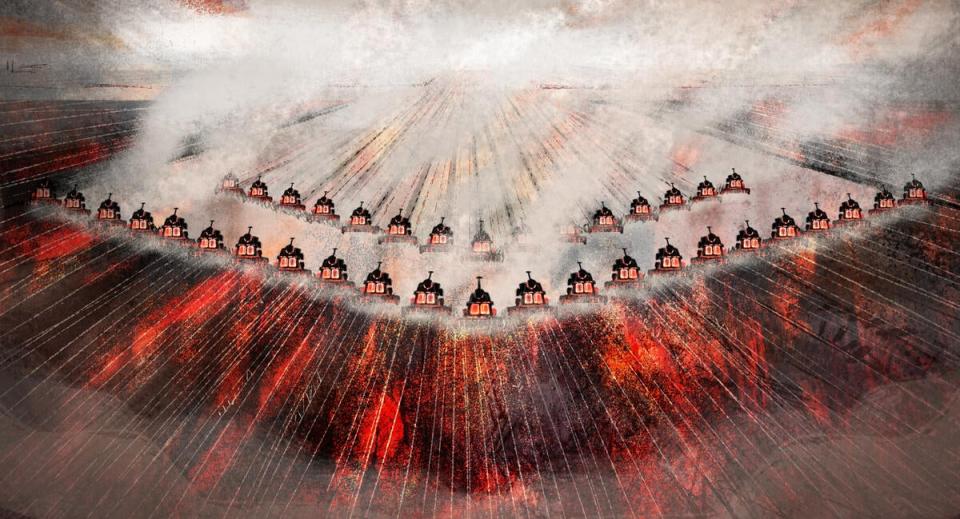There’s a monster in my kitchen: New Greenpeace video exposes destruction of forests for industrial meat production

A new Greenpeace video featuring Brazilian actor Wagner Moura, who plays drug lord Pablo Escobar in the TV series Narcos, has been released to highlight the role of industrial meat production in rainforest destruction.
The video, titled “There’s a Monster in my Kitchen”, tells the story of a young boy who comes downstairs in the night to the fridge only to find a terrifying beast - Jag-wah, the jaguar - is unexpectedly in his home.
Jag-wah shows the young boy how the humans taking over his forest home to produce meat are fueling the clearance of precious forests - both for feed for animals reared for meat, and for space to graze the herds themselves.
The release of the video comes as a new analysis by Greenpeace UK of the latest fire data from Brazil’s National Institute for Space Research suggests that an area almost equivalent to the size of the UK has burned across Brazil so far this year.
Last year’s Amazon fires caught the media’s attention but the 2020 fire season has seen new records set across the board. Across Brazil, 226,485 sq km of land had burned up until the end of September.
The Amazon has seen the worst fire season in a decade and it has been the worst ever recorded in the world’s largest wetlands, the Pantanal, and happened despite a supposed “ban on fires” set by Brazilian president Jair Bolsonaro in July.
Meat is the single biggest driver of deforestation worldwide, with the push for space to produce beef and animal feed crops like soya being a key reason for clearances in the South American forests, Greenpeace said.
This destruction is catastrophic for indigenous groups who face violence from ranchers and illegal loggers. It is also harmful to forest wildlife - the Pantanal fires have put at least 600 jaguars in danger, out of an estimated population of 2,000 in the region - and for the fight against climate breakdown.
In 2018 Greenpeace UK’s video “Rang Tan” became an internet sensation when it was banned from UK TV screens after it was deemed too political by the UK’s advertising approval agency. The video explored the impacts of palm oil production on the Indonesian rainforests.
Anna Jones, head of forests at Greenpeace UK, said: “This film shows powerfully just why our future depends on eating less meat and dairy. Scientists are telling us that in fewer than 20 years the Amazon could collapse. This is being driven by the actions of industrial-scale meat companies.
“We need urgent action now. These forests are incredibly important, for the indigenous peoples who call them home, for their unique wildlife and for the health of our planet. To protect forests it’s time to turn away from industrial meat. Supermarkets and fast food companies who sell huge amounts of industrially produced meat must face up to their impact - drop forest destroyers and commit to replacing half their meat with healthy plant-based options by 2025.”

Sir Paul McCartney has also thrown his support behind the video and called on supermarkets and restaurants to “clean up their supply chains” and move away from meat.
He said: “The world’s forests are truly irreplaceable. They’re home to indigenous peoples, amazing wildlife and are vital in our fight against the climate crisis. But, as Greenpeace's ‘Monster’ animation so powerfully shows, these forests are being cleared at a shocking rate to farm more industrial meat and dairy.
“This is why reducing our meat is so important. But that alone isn’t enough. To solve this problem, we need supermarkets and fast food restaurants to clean up their supply chains and make the switch to less destructive, plant-based alternatives. Our forests – and all our futures – depend on it.”
Wagner Moura, the Golden Globe nominated actor who voiced the animation, said many people did not realise many of the products in their homes may be “responsible for the fires and chainsaws devastating the Amazon”.
He said: “There are few more incredible and precious places on earth than rainforests like the Amazon. Yet many don’t know that the meat and dairy products sitting in our refrigerators could be responsible for the fires and chainsaws devastating the Amazon and other vital forests. Monster meat companies continue to clear forests at an astonishing rate, all to produce the meat in our kitchens. We need to take action before it’s too late.”
He added: “I’m so pleased to be working on this crucially important film with Greenpeace. This fight has never been more urgent. Together we can stand against the industrial meat companies razing our precious forests. I hope this film inspires many more to join our mission to protect forests.”
Read more
Climate crisis could turn 40% of Amazon rainforest into savanna
Photos show ‘illegal’ burning of Amazon amid record deforestation
Amazon fires miscalculated and are actually worst in a decade

 Yahoo Finance
Yahoo Finance 